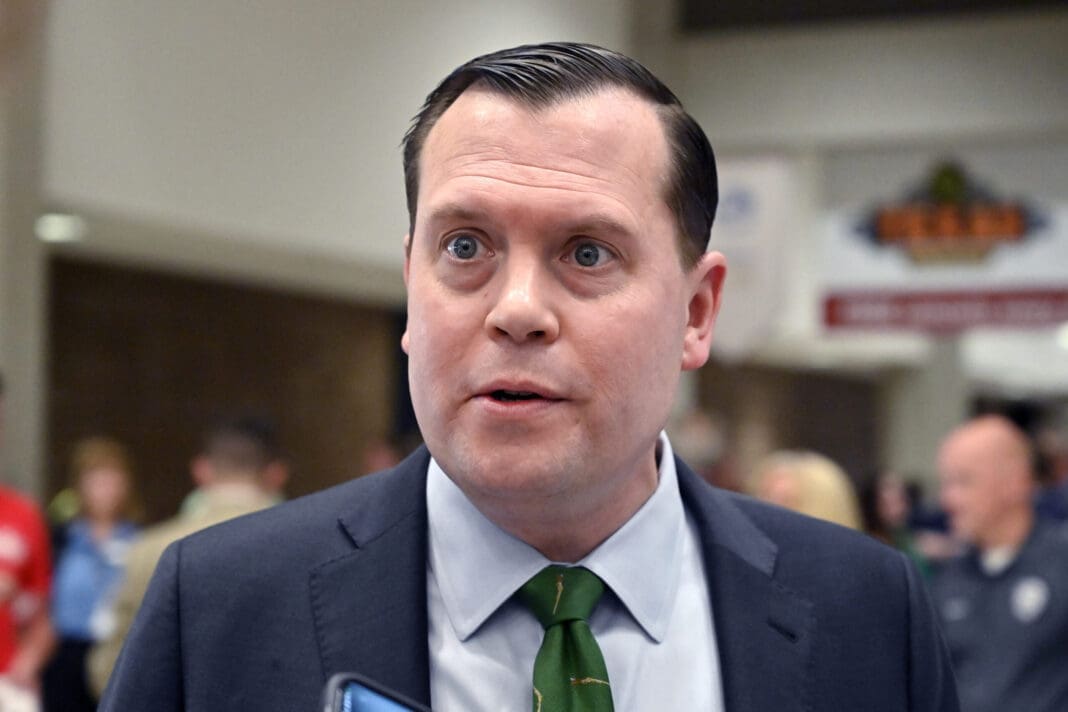GOP Kentucky attorney general candidate's campaign got thousands from opioid lobbyists
Russell Coleman said fighting the opioid crisis would be his top priority as Kentucky’s top law enforcement officer, but he received a total of $3,500 from four lobbyists for companies that helped fuel the deadly opioid epidemic.

Russell Coleman, the Republican nominee for attorney general in Kentucky in November, has made fighting the “crisis of addiction” one of the cornerstones of his campaign. He vowed in his first campaign video that he would continue the job to “make America safe again by stopping the people who are poisoning our communities with deadly drugs” he started “as the chief federal law enforcement officer for President Trump in west Kentucky.”
Coleman has been vocal in blaming the medical community for its role in the opioid crisis. In 2018, when he served as the U.S. attorney for the Western District of Kentucky, Coleman called medical professionals’ role in the epidemic “staggering in scope.”
But as a candidate, Coleman has taken thousands of dollars in campaign contributions from lobbyists for McKesson, CVS, and United Healthcare — which have paid billions of dollars to settle lawsuits connected to their alleged roles in contributing to the opioid crisis. Coleman took a total of $3,500 from those lobbyists, according to an American Independent Foundation review of campaign finance records.
Coleman accepted $1,000 each from Michael Biagi and Kelley Abell, registered lobbyists for McKesson. In 2022, McKesson settled a national lawsuit brought by state and local governments and Native American tribes for $7.4 billion. Though McKesson did not admit to any wrongdoing, the lawsuits accused the company of allowing addictive opioid painkillers to fall into illegal drug markets.
Coleman also received $500 in campaign contributions from Marc Wilson, a lobbyist for CVS Health. In December 2022, CVS agreed to pay $5 billion to settle a lawsuit brought by two counties in Ohio that accused the company of filling suspicious opioid orders at pharmacy counters and corporate headquarters.
And Coleman took a $1,000 contribution from United Healthcare lobbyist Jason Underwood. United Healthcare is currently facing a lawsuit from a third Ohio county that alleges its pharmaceutical division failed “to maintain effective controls to prevent diversion in their own dispensing of opioids and to monitor their own claims data to prevent suspicious or inappropriate prescriptions of dangerously lethal opioids from reaching the community.”
Kentucky has been hit particularly hard by the opioid crisis.
In 2021, 2,250 people in Kentucky died from drug overdoses, according to the state government, 70% of which were fentanyl overdoses. In 2020, Kentucky had the second-highest death rate from drug overdoses in the country, behind only West Virginia, according to the Centers for Disease Control and Prevention.
Both Coleman and his Democratic opponent, state Rep. Pam Stevenson, have made tackling the opioid crisis part of their campaigns.
Both the Republican primary and the Democratic primary for Kentucky attorney general have been canceled in 2023, with Coleman and Stevenson running unopposed. The position was left open after Attorney General Daniel Cameron decided to run for the Republican nomination for governor.
The general election will take place on Nov. 7, 2023.
Published with permission of The American Independent Foundation.
Recommended

New NC GOP chair flirts with bogus stolen election conspiracies
Simmons predecessor was a staunch 2020 election denier
By Jesse Valentine - April 19, 2024
Texas activists pushed abortion restrictions in NM cities and counties, records show
Emails reveal influence and control in exchange for promises of legal help
By Austin Fisher, Source NM - March 04, 2024
Cannabis workers across Missouri begin push to unionize dispensaries
The first day was a breeze. Sean Shannon and Danny Foster walked into several marijuana dispensaries around Missouri with their matching “Union For Cannabis Workers” shirts and talked to employees about the possibility of unionizing. “The first day, there were 57 stops amongst the teams,” said Shannon, lead organizer with UFCW Local 655, which actually […]
By Rebecca Rivas - December 04, 2023










































































